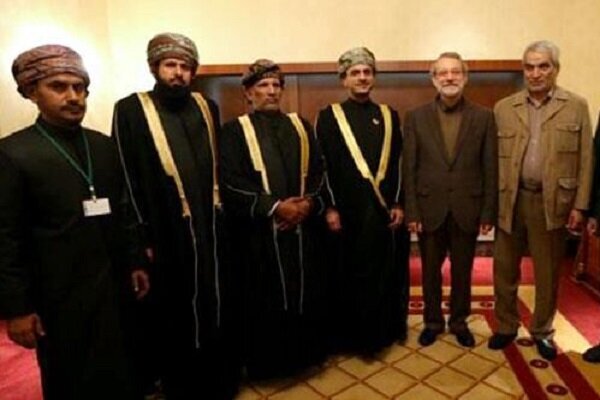Iran, Oman voice pleasure as hopes rise over cession of war in Yemen

TEHRAN - Iranian Parliament Speaker Ali Larijani and Omani Deputy Parliament Speaker Abdullah Al Amri on Saturday expressed pleasure over relative ceasefire in Yemen, underlining their respective countries' support for a peaceful settlement of the war in the country.
The top Iranian and Omani parliamentarians met on the sidelines of the 12th plenary session of the Asian Parliamentary Assembly (APA) in Antalya, Turkey.
Larijani praised Oman for mediating between the warring sides in Yemen, saying, "Your role was wise and rational. We hope that talks on Yemen would lead to a practical measure and an actual ceasefire.”
He stressed that accepting a partial ceasefire in Yemen is a “logical path.”
Al Amri, for his part, voiced his country's readiness to increase efforts to find a solution to the war in impoverished Yemen.
“The situation in Yemen is improving. Efforts to settle the conflict have been formed in the most appropriate way possible,” he assured.
In April 2015, Iranian Foreign Minister Mohammad Javad Zarif submitted a letter to Ban Ki-moon, then UN secretary-general, outlining its four-point peace plan for Yemen.
The plan called for an immediate ceasefire and end of all foreign military attacks, humanitarian assistance, a resumption of broad national dialogue and establishment of an inclusive national unity government.
On November 22, United Nations Yemen envoy Martin Griffiths told the UN Security Council that the number of airstrikes by the Saudi-led coalition battling Houthis in Yemen has dropped nearly 80% in the last two weeks.
The coalition, which intervened in the war in 2015 to try to restore the ousted Sanaa government, has carried out thousands of airstrikes that have killed thousands of civilians at hospitals, schools, and markets, drawing international criticism.
De-escalation of hostilities is a major aspect of informal talks that have been going on between Saudi Arabia and Houthi officials on a ceasefire in Yemen since September.
“In what is perhaps an even more important sign that something is changing in Yemen..., in the last two weeks the rate has dramatically reduced: there were almost 80% fewer airstrikes nationwide than in the two weeks prior,” Reuters quoted Griffiths as telling the Security Council by videoconference from his Amman office.
He added that there had been “entire 48-hour periods without airstrikes” for the first time since the conflict began in 2014 when the Houthi movement ousted the government of President Abd-Rabbu Mansour Hadi from power in Sanaa.
The talks began after the Houthis offered to halt cross-border missile and drone attacks on Saudi cities if the Saudi-led coalition ended airstrikes on Yemen.
“We call this de-escalation, a reduction in the tempo of the war, and perhaps a move towards an overall ceasefire in Yemen that...many members of this Council have been calling for a very long time,” Griffiths said by a video conference from Amman, where his office is based.
The UN diplomat added that skirmishes between the warring parties in the port city of Hodeidah, where the two sides agreed on a ceasefire last year, have been reduced by 80 percent after the deployment of UN monitors in recent weeks.
The war has killed more than 100,000 people and pushed millions to the brink of famine, according to the Armed Conflict Location & Event Data Project, a non-governmental organization.
Griffiths has said he hopes for a resolution to the conflict in the first few months of 2020.
Leave a Comment